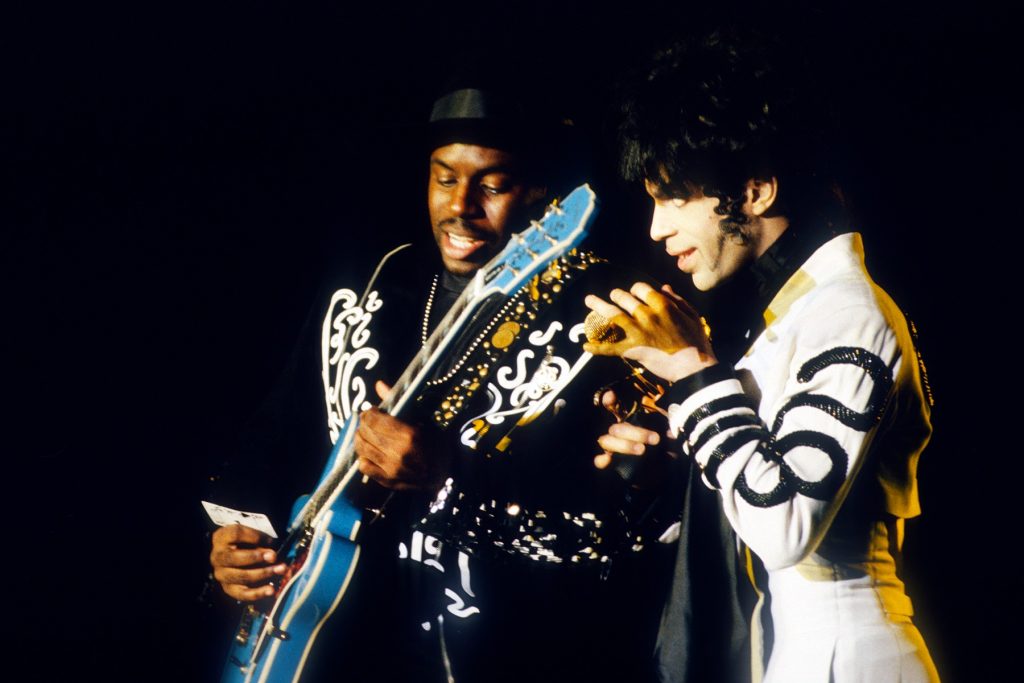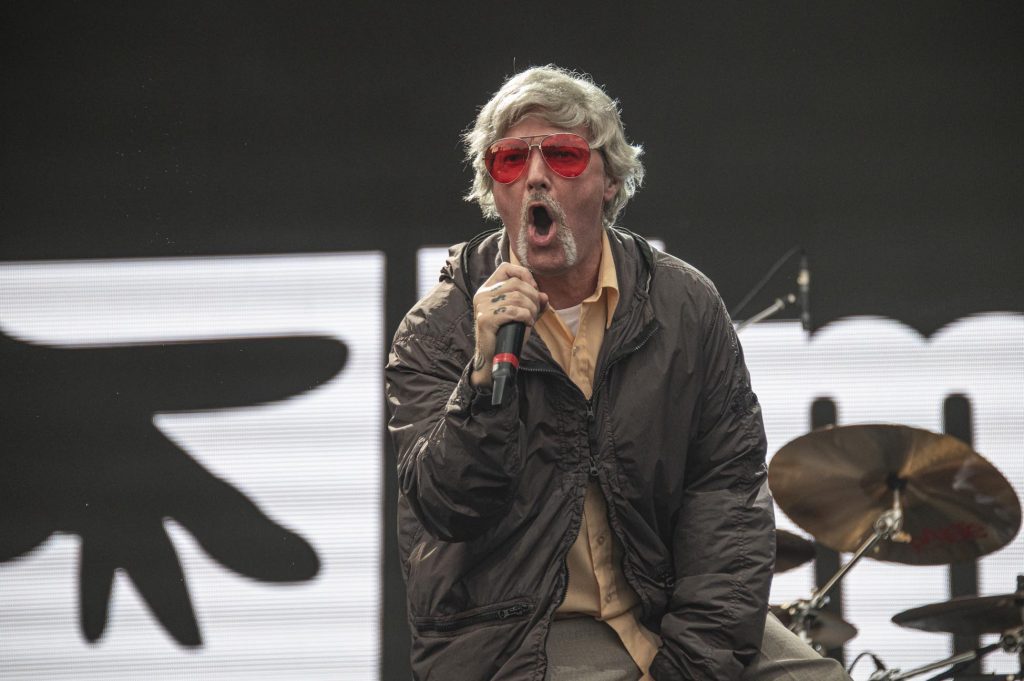
What Was It Like to Play Bass for Prince?
Like many of Prince’s former collaborators, Levi Seacer, Jr. still refers to his old boss in the present tense. Seacer joined Prince’s post-Revolution touring band on bass not long before the release of 1987’s Sign O’ the Times, and stuck around as the band morphed into the New Power Generation, switching to guitar. With the mammoth new reissue of Sign O’ the Times out now, Seacer looked back at some of the highlights of his time with Prince, whom he met through longtime mutual collaborator, Sheila E.
What was your very first meeting with Prince like?
I’ve never told this story before, but there was a time when I was going to be in the [Prince protégé] group the Family. I used to play jazz fusion with Sheila E. in clubs in the Bay Area. When the Family came out, there were some problems with who was going to play guitar. So Sheila said, “Check out Levi.” So they flew me to Minnesota. I auditioned for [Family members] Jerome [Benson] and Jellybean [Johnson] and I got the gig as guitarist.
blogherads.adq.push(function () {
blogherads
.defineSlot( ‘medrec’, ‘gpt-dsk-tab-article-inbody1-uid0’ )
.setTargeting( ‘pos’, [“mid-article”,”mid”,”in-article1″,”mid-article1″] )
.setSubAdUnitPath(“music//article//inbody1”)
.addSize([[300,250],[620,350],[2,2],[3,3],[2,4],[4,2]])
;
});
But the next morning, they said, Prince wants to talk to you. He’s like, “Oh, man, you sounded good. But, um, I gotta send you back. And I’ll explain once you get back.” So when I got back, Prince flew to the Bay Area, and he played with Sheila at some club, sitting in, and he invited me down. And he said, “Hey, man, I really liked your playing. I’m sure I’m gonna come up with something else for you.” He said, “What happened was, I was just trying to teach somebody a lesson, ’cause they thought they couldn’t be replaced. And I wasn’t sure if they could be replaced!” It was a James Brown move. James Brown always had two to three sets of players.
So Sheila, was still doing her thing as Sheila E., but when she did the Romance 1600 album [helmed by Prince, released in 1985], she had auditions for bass guitar. So I got to get on bass. And then when Prince came back, he said, “Haven’t I met you before before?” I said, “I’m on bass with Sheila now.” And so he started laughing, because he plays multiple instruments, too. So, anyway, my first time was kind of bittersweet!
And even before he hired you as part of his post-Revolution band, you spent a lot of time around him, right?
Prince came up for our rehearsals [with Sheila E] a lot. So I got to know him pretty well. He was always hanging out with us. We had a pretty good map on about 80 percent of what it would be like.
When you officially joined his band, had he essentially finished recording ‘Sign O’ the Times’?
He was probably about 90 percent done, and he gave us copies. And he said, ‘Hey, this is how we do it. I’m pretty serious about rehearsals. I’m gonna give you two or three songs to learn every night, and what I mean by learning the songs is when I come in the next day, when I count it off, it better sound like the record. And he explained, rehearsal was not for rehearsal. He said, “You learn somewhere else. Rehearsal is for me to edit the songs. And I’m not going to edit them until I know you guys know them inside out.” So, man, in 10 or 11 days, we knew a three-album set, top to bottom. Right? And he did some major editing. He would take whole sections out of songs. And in our heads we were like, “Oh, no, I spent two hours learning that part!”
What was he like during that period as opposed to the other times you were with him?
I can tell you exactly: There’s a picture from that period where he’s got this orange outfit, and he’s got these reading glasses on. He was really studying things as he was producing them. It’s like he was in his own college, and he was his own professor. But he was in a very experimental mode, really exploring a lot of boundaries that he had never touched. Every major artist has a peak album. Sign O’ the Times was Prince’s Songs in the Key of Life.
blogherads.adq.push(function () {
blogherads
.defineSlot( ‘medrec’, ‘gpt-dsk-tab-article-inbody2-uid1’ )
.setTargeting( ‘pos’, [“mid-article2″,”mid”,”in-article2″,”mid-article”] )
.setSubAdUnitPath(“music//article//inbody2”)
.addSize([[300,250],[300,251],[620,350],[2,4],[4,2]])
;
});
What was it like to play bass, and later guitar, for someone who plays those instruments so well himself?
If he don’t think you can play it like he would play it, you ain’t getting the gig! Not a lot of artists can do that, where they can hear something and actually play what they’re hearing. Michael Jackson would bring in a lot of famous bass players and give them a little idea. But he couldn’t pick up the instrument and say, “It’s like this.” No disrespect to Michael. James Brown, he hummed parts. Prince could play exactly like the record and beyond. So the goal was to try to get as close to that as possible. Now, if you couldn’t do that, then you get a plane ticket home. [laughs]
There’s so many great outtakes on the new set. What insight did you get into his thoughts on selecting tracks to release?
He said, “It’s hard sometimes, but that you have to pick spiritually. Your ego wants to go for, ‘Yeah, that’s a hit record.’ But spiritually, some cuts that are not meant to be hit records are meant to be on the album, and they serve another purpose.” It’s hard, man. Even the hit records. One time, he said, “I want you to hear something.” So his engineer brought up “When Doves Cry,” with a 100-piece orchestra on it. And I said, “Wait a second, how did you mute all of that and just leave a drum track with vocals?” He said, “Levi, that was one of the hardest decisions of my life.”
What was it like to experience the relentless level of productivity Prince had?
Well, I’ll share this with you. We had finished the [1991] Diamonds and Pearls record. But Warner Bros. didn’t think we had the first single. They knew we had a lot of singles on it, but they felt like we didn’t have a kick-off single. I did all the talking with some of these companies for him. And so I said, “Hey, man, I just talked to Warner Bros. They don’t feel like we have a kick-off single.” He said, “What? That’s impossible!” He said, “OK, I’ll see you tomorrow.” But then he called me back about six hours later. He had written “Cream.”
And not only had he written it, but he recorded about 70 percent of it. So he said, “You think they’ll like this?” I’m like, “Oh, yeah.”
[Find the Sign O’ the Times Super Deluxe Edition Here]
blogherads.adq.push(function () {
blogherads
.defineSlot( ‘medrec’, ‘gpt-dsk-tab-inbodyX-uid2’ )
.setTargeting( ‘pos’, [“mid”,”mid-articleX”,”in-articleX”,”mid-article”] )
.setSubAdUnitPath(“music//article//inbodyX”)
.addSize([[300,250],[300,251],[3,3],[620,350]])
.setLazyLoadMultiplier(2)
;
});




